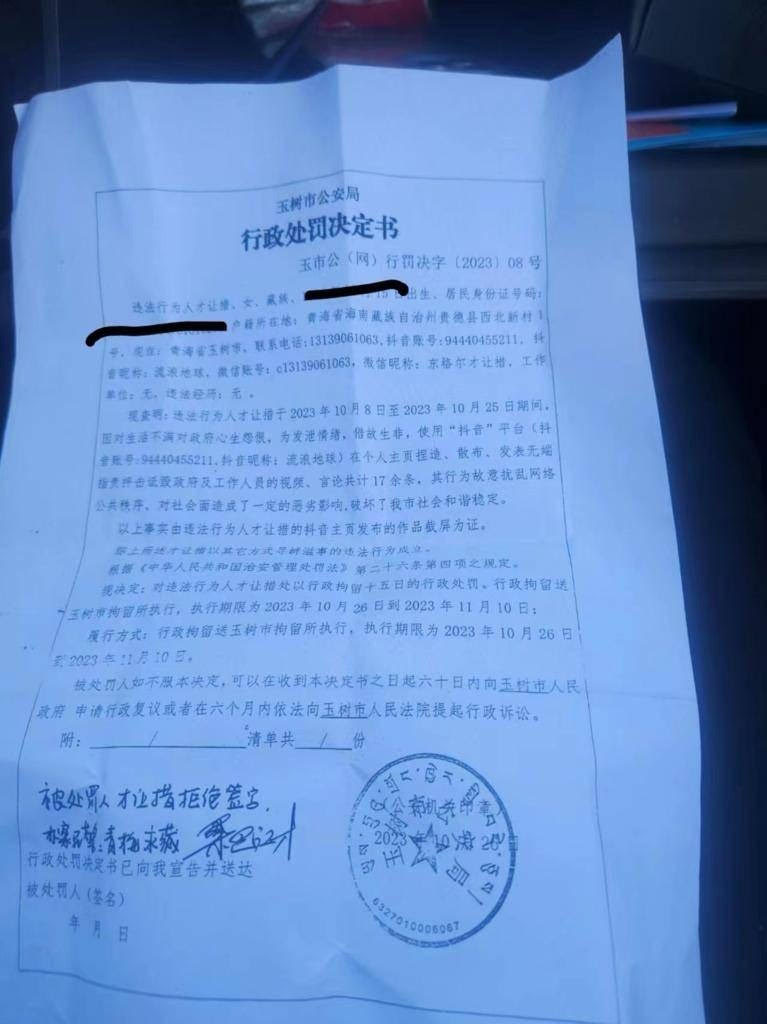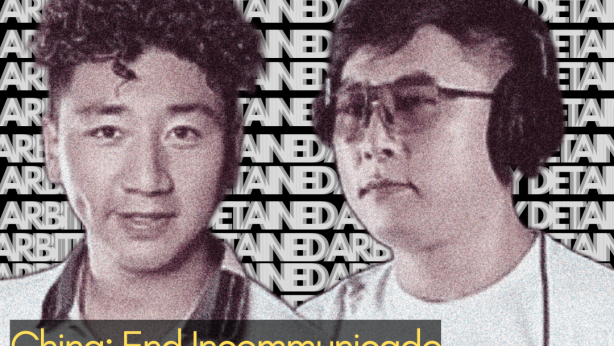Human rights defender detained for exposing online official practice of racial discrimination against Tibetans
Tibetan human rights defender Tsering Tso had been subjected to arbitrary detention for the second time in three years for her social media posts calling out Chinese authorities for engaging in human rights abuses against Tibetans in Kyegudo (Ch: Yushu) Tibetan Autonomous Prefecture, Qinghai Province, in the Tibetan province of Kham.
Tso was sentenced to 15 days of “administrative detention” by the Yushu Public Security Bureau (PSB) in the Yushu city detention centre from 26 October to 10 November 2023.
According to the official letter by the Yushu Public Security Bureau posted by Tsering Tso on her WeChat on 11 November 2023, The Yushu PSB or police claimed that between 8 and 25 October 2023, Tso committed the crime of “picking quarrels and provoking troubles” by posting a series of videos and personal statements on her Douyin account to “falsely accuse the government and spread misinformation on her private social media”.

The allegation of “picking quarrels and provoking troubles,” often directed at human rights defenders, minority ethnicities, critics, dissenters, and individuals deemed disloyal, is a legal tool to compel alignment with the official narrative, functioning as a means to deter questioning and dissent. Whether operating at the central or local level, the party-state assumes an authoritative role in delineating the boundaries of what constitutes picking a quarrel and provoking trouble. Essentially, any deviation from the official mass line falls within this defined category.
After examining Tso’s social media posts on Douyin, TCHRD can confirm that the Yushu PSB failed to address the legitimate grievances and issues Ms Tso raised and misused its discretionary powers.
In a video statement posted on 16 October 2023, Tso criticised the “feudalistic mindset” of official power holders and how it hinders the “hardworking and educated people from ordinary households to accomplish great deeds and realise their dreams”. She also called out the local leaders for misusing their power to further personal interests and subjecting ordinary people to corrupt bureaucratic practices.
In another video posted on 19 October 2023, she shared the challenges she faced in opening her own business in Kyegudo city, exposing the unfair practices of the local government leaders. Her efforts to operate business enterprises from 2016 onwards in the city have met with undue pressure and harassment from the local government authorities.
One of her widely viewed posts was a video she captured at the Lhasa railway station in July 2023, in which she called out the railway authorities for engaging in blatant racial discrimination against Tibetan passengers who were asked to show additional documents while Chinese tourists proceeded unhindered without any scrutiny or examination. She can be heard speaking Chinese in the video, “Lhasa authorities are violating the nation’s laws; they are engaging in racial discrimination. Chinese individuals with Identification Cards merely need to show their faces to pass. In contrast, Tibetans face restrictions despite possessing all requisite legal documents. Only Chinese individuals without Identification Cards are instructed to register. Meanwhile, we Tibetans, with all legal documentation in order, are denied passage. Look! The Chinese are permitted to pass without impediment. They encounter no issues. What does this convey? Does it not demonstrate a lack of racial equality? Is this not unmistakable racial discrimination?”
Yet another video shows her directly asking a police officer about the directive mandating Tibetans [from Tibetan areas outside Tibet Autonomous Region] to obtain permits to travel to Lhasa. She argues that such a rule constitutes evident discrimination against Tibetans.
An important issue she raises in one of her videos is the existing discrepancy between the operation of travel agencies in China and those in the Tibet Autonomous Region (TAR). She asserts that while travel agencies in China could function autonomously, those in TAR are monopolised by one or two entities, primarily the Lhasa Communications Industry Group Company. This monopoly is facilitated, in part, through collaboration with the Border Management Office.
The Border Management Office, instead of focusing on its designated responsibilities, misuses its power to assist the monopolisation of the Lhasa Transportation Industry Group Company, which is evident in its practices, where only vehicles of the Lhasa Transportation Industry Group are permitted.
“This unjust practice restricts the freedom of other agencies, leaving approximately 300 drivers from non-monopolised agencies unemployed, as their cars are denied permits. Furthermore, the agency with the monopoly maintains a limited fleet, resulting in exorbitant car fares ranging from 2500 to 3000 yuan.”
Tsering Tso is originally from Trika (Ch: Guide) County in Tsolho (Ch: Hainan) Tibetan Autonomous Prefecture but works and lives in Yushu City. She operates the Tibet World Tours and Travel, specialising in organising tours in various regions, including Lhasa City, Ngari, and other parts of Tibet, as well as destinations in other parts of the world.
This is the second time we have received information about her detention. Previously, in November 2020, Tsering Tso was apprehended in Siling (Ch: Xining), the capital of Qinghai Province, on charges related to disrupting “social stability”. She was subsequently transported to Trika (Ch: Guide) County in Tsolho (Ch: Hainan) and detained for ten days, along with a fine of 1000 Chinese yuan. Throughout her detention, she was provided only steamed bread and water, leaving her in a state of starvation. Additionally, she faced constant threats, with her 80-year-old father also being subjected to intimidation during this period.
In China, Public Security Bureau (PSB) officers frequently conduct administrative detention practices characterised by a vague legal framework that grants extensive discretionary powers. Administrative detention practices often include the extensive use of torture and ill-treatment, and expecting any supervision of such misconduct is impractical, as high-ranking officials in the upper echelons tend to incentivise the suppression of dissent and criticism. However, the malpractices of administrative detention directly contradict the promises outlined in Article 37 of the Chinese Constitution, which explicitly safeguards the liberty of citizens, stating, “The personal freedom of citizens of the People’s Republic of China shall not be violated.
No citizen shall be arrested unless with the approval or by the decision of a people’s procuratorate or by the decision of a people’s court, and arrests must be made by a public security organ.
Unlawful detention, or the unlawful deprivation or restriction of a citizen’s personal freedom by other means, is prohibited; the unlawful search of a citizen’s person is prohibited.”
In 2017, Tsering Tso advocated for the issuance of travel permits for Yushu residents legally. Subsequently, the Public Security Bureau dispatched people to physically assault her. Following the incident, an attempt was made to downplay the perpetrators as ordinary individuals under the influence of alcohol engaging in unruly behaviour. In response to this, Tsering Tso shared authentic documents online to counter the denial of justice. Given her prior experiences of enduring similarly severe and oppressive circumstances, and facing a recurrence of such incidents, she emphasised the imperative of a fair and just resolution. Consequently, her post addressing these concerns was made unavailable for public viewing.


